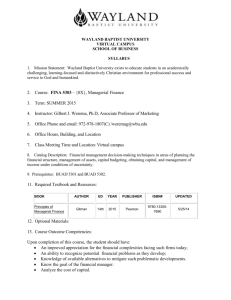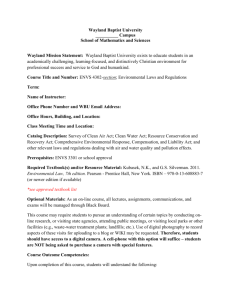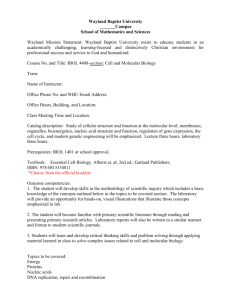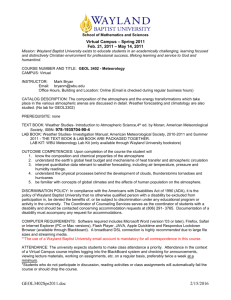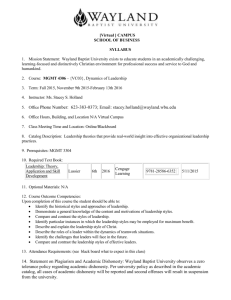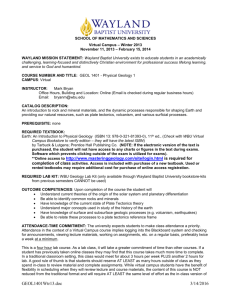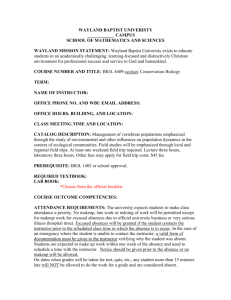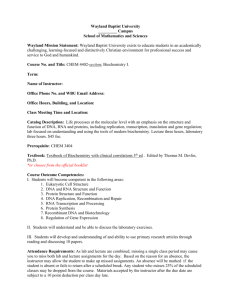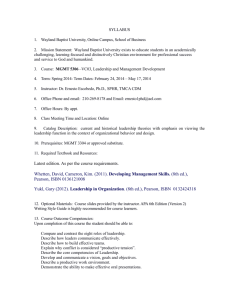Meteorological - Wayland Baptist University
advertisement
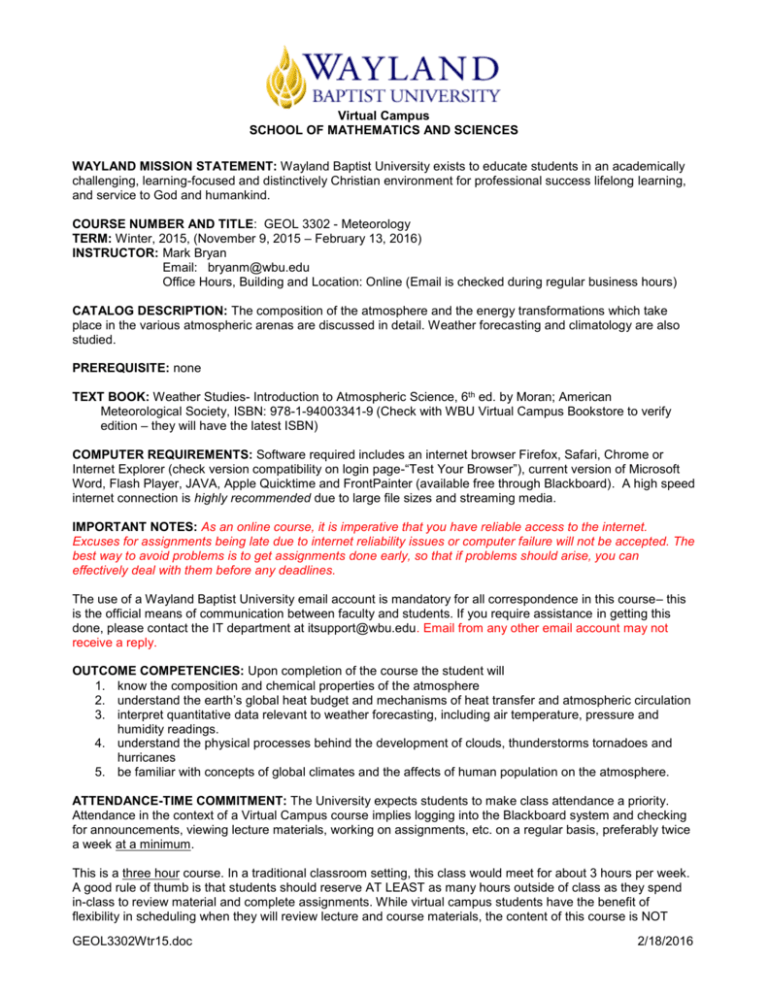
Virtual Campus SCHOOL OF MATHEMATICS AND SCIENCES WAYLAND MISSION STATEMENT: Wayland Baptist University exists to educate students in an academically challenging, learning-focused and distinctively Christian environment for professional success lifelong learning, and service to God and humankind. COURSE NUMBER AND TITLE: GEOL 3302 - Meteorology TERM: Winter, 2015, (November 9, 2015 – February 13, 2016) INSTRUCTOR: Mark Bryan Email: bryanm@wbu.edu Office Hours, Building and Location: Online (Email is checked during regular business hours) CATALOG DESCRIPTION: The composition of the atmosphere and the energy transformations which take place in the various atmospheric arenas are discussed in detail. Weather forecasting and climatology are also studied. PREREQUISITE: none TEXT BOOK: Weather Studies- Introduction to Atmospheric Science, 6th ed. by Moran; American Meteorological Society, ISBN: 978-1-94003341-9 (Check with WBU Virtual Campus Bookstore to verify edition – they will have the latest ISBN) COMPUTER REQUIREMENTS: Software required includes an internet browser Firefox, Safari, Chrome or Internet Explorer (check version compatibility on login page-“Test Your Browser”), current version of Microsoft Word, Flash Player, JAVA, Apple Quicktime and FrontPainter (available free through Blackboard). A high speed internet connection is highly recommended due to large file sizes and streaming media. IMPORTANT NOTES: As an online course, it is imperative that you have reliable access to the internet. Excuses for assignments being late due to internet reliability issues or computer failure will not be accepted. The best way to avoid problems is to get assignments done early, so that if problems should arise, you can effectively deal with them before any deadlines. The use of a Wayland Baptist University email account is mandatory for all correspondence in this course– this is the official means of communication between faculty and students. If you require assistance in getting this done, please contact the IT department at itsupport@wbu.edu. Email from any other email account may not receive a reply. OUTCOME COMPETENCIES: Upon completion of the course the student will 1. know the composition and chemical properties of the atmosphere 2. understand the earth’s global heat budget and mechanisms of heat transfer and atmospheric circulation 3. interpret quantitative data relevant to weather forecasting, including air temperature, pressure and humidity readings. 4. understand the physical processes behind the development of clouds, thunderstorms tornadoes and hurricanes 5. be familiar with concepts of global climates and the affects of human population on the atmosphere. ATTENDANCE-TIME COMMITMENT: The University expects students to make class attendance a priority. Attendance in the context of a Virtual Campus course implies logging into the Blackboard system and checking for announcements, viewing lecture materials, working on assignments, etc. on a regular basis, preferably twice a week at a minimum. This is a three hour course. In a traditional classroom setting, this class would meet for about 3 hours per week. A good rule of thumb is that students should reserve AT LEAST as many hours outside of class as they spend in-class to review material and complete assignments. While virtual campus students have the benefit of flexibility in scheduling when they will review lecture and course materials, the content of this course is NOT GEOL3302Wtr15.doc 2/18/2016 reduced from the traditional format and will require AT LEAST the same level of effort as the in-class version of the course! Therefore, in order to succeed in this course, students should be prepared to invest a MINIMUM of 6 HOURS per week, with additional effort required to study for assignments or to prepare for exams. The course is not designed as a self-paced course, and will be very difficult if the student falls behind. If any student expects special consideration because of family, job requirements and/or taking other classes, please do not enroll in this course. In order to remain fair to everyone, expectations are the same for all students. It is up to each student to decide prior to enrolling if they will have adequate time to commit to the course. No excuses because of other classes or commitments will be accepted for student’s failure to comply with these requirements.* STATEMENT ON PLAGIARISM AND ACADEMIC DISHONESTY: Wayland Baptist University observes a zero tolerance policy regarding academic dishonesty. Per university policy as described in the academic catalog, all cases of academic dishonesty will be reported and second offenses will result in suspension from the university. DISABILITY STATEMENT: In compliance with the Americans with Disabilities Act of 1990 (ADA), it is the policy of Wayland Baptist University that no otherwise qualified person with a disability be excluded from participation in, be denied the benefits of, or be subject to discrimination under any educational program or activity in the university. The Coordinator of Counseling Services serves as the coordinator of students with a disability and should be contacted concerning accommodation requests at (806) 291-3765. Documentation of a disability must accompany any request for accommodations. It is the responsibility of the student to inform the instructor of any disability that may require accommodation during the lecture or laboratory portions of the course. It is of particular importance to report any condition or disability that may affect the laboratory safety of the individual or others. Information provided for this purpose will be kept strictly confidential and will not in any way affect the individual’s course grade. COURSE REQUIREMENTS: Students will be evaluated by examinations, class assignments, etc. as described in this syllabus under the heading “Evaluation”. EVALUATION: University Grading System: A=90-100, B=80-89, C=70-79, D=60-69, F=below 60. The final class grade will be based on the average of grades that are earned as listed below. Tests 5 (120 points each) 600 60% Discussions 5 (30 points each) 150 15% Assignments/Readings 10 (25 points each) 250 25% 1000 100% Students who do not participate in discussion, reading activities or class assignments will automatically fail the course or should drop the course. Also, students who do not pass at least half the assignments will automatically fail the course. Exams*: The 5 online tests will have specific dates for completion (to be announced). Tests not completed by that date will be graded as 0*. All exams are set to be completed within a specific amount of time. Exceeding the time limit will result in point deduction of 1 point per minute. Exams are not designed as open-book exams. There is ample time to complete each exam provided adequate preparations and study have been done. There will not be enough time to complete these exams if students attempt to lookup the majority of questions. NOTE: Due to university policy (stated in the student handbook), the final exam CANNOT be administered earlier than posted dates. The final will only be available Tuesday through Friday, the final week of the term. Readings*: Several journal articles will be provided which students will review and submit summaries. Assignments*: With the exception of the final exam, all class activities are due no later than Midnight, Monday on the date listed under DUE DATES. This time is based on Plainview time (Central Time Zone U.S.). Late activities are graded as 0. Assignments may be completed in advance of the week assigned but should be completed in the order listed. Assignments will not be graded before their due date. Online forums/discussion*: Several questions/discussion topics will be posted during the term. Students are expected to respond to these postings and to each other’s responses. These topics may be of current events, new discoveries or any variety meteorology related items. Student responses may require some additional reading and extensive thought or may be just asking for their opinion. In addition, the instructor expects emails with questions or other concerns about the class and its activities. GEOL3302Wtr15.doc 2/18/2016 *Exception for serious illness (hospital time) or major emergencies may be allowed only at instructor discretion. You will be required to furnish evidence of any extenuating circumstances. If you are military and will be going TDY during the course, you need to let me know ahead of time (verification from your C.O. may be required). Students shall have protection through orderly procedures against prejudices or capricious academic evaluation. A student who believes that he or she has not been held to realistic academic standards, just evaluation procedures, or appropriate grading, may appeal the final grade given in the course by using the student grade appeal process described in the Academic Catalog. Appeals may not be made for advanced placement examinations or course bypass examinations. Appeals are limited to the final course grade, which may be upheld, raised, or lowered at any stage of the appeal process. Any recommendation to lower a course grade must be submitted through the Executive Vice President/Provost to the Faculty Assembly Grade Appeals Committee for review and approval. The Faculty Assembly Grade Appeals Committee may instruct that the course grade be upheld, raised, or lowered to a more proper evaluation. COURSE SCHEDULE OUTLINE: (refer to “Due Dates” document for specific dates all coursework will be available) Date Week of 11/09 11/16 11/23 11/30 12/07 12/14 12/21 01/04 01/11 01/18 01/25 02/01 02/08 week subject 1 Monitoring weather & The atmosphere 2 Heating the atmosphere Thanksgiving Break (11/22/15-11/28/15) Exam 1 3 Air temperature & Circulation 4 Air pressure 5 Humidity, stability & humidity Christmas Break (12/21/15-01/01/16) Exam 2 6 Clouds & Precipitation Exam 3 7 Atmospheric circulation & Winds 8 Air masses and fronts Exam 4 9 Thunderstorms & Tornadoes 10 Hurricanes & Tropical systems Exam 5** 11 Forecasting & Global Climate # chapter 1, 2, 13 (to pg. 449) 3 4 5 6 7 8&9 9 & 10 11 12 13 (from pg. 449) & 15 EXAM 1 covers weeks 1-2 EXAM 2 covers weeks 3-4 EXAM 3 covers weeks 5-6 EXAM 4 covers weeks 7-8 EXAM 5 covers weeks 9-11 **EXAM 5 is a proctored exam (if it is impossible to arrange for a proctor, do not enroll in the course). **Remote proctoring will NOT be an option. All coursework MUST be completed by the end of the term. NOTES: The instructor expects emails with questions or other concerns about the class and any activities. Communication with the instructor regarding due dates should be done BEFORE items are due. Exams, discussions and assignments are set to close at a pre-determined time (based on Plainview-CST). Failure to submit any coursework by the posted deadline will result in a 0. This outline and other syllabus items are subject to change at university or instructor discretion. GEOL3302Wtr15.doc 2/18/2016
